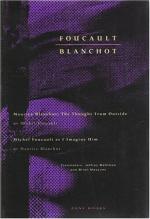|
This section contains 1,356 words (approx. 5 pages at 300 words per page) |

|
Maurice Blanchot was first and foremost a literary theorist, and his work included a number of essay collections, among them The Space of Literature (1982), The Book to Come (2003), and Friendship (1997). He also wrote powerful but rather hermetic novels such as Thomas the Obscure (1973), Death Sentence (1978), Aminadab (2002), and The Most High (1996), in addition to aphoristic works such as The Writing of the Disaster (1986). Blanchot's work has profound implications for the practice of philosophy. His influence therefore stretches from practitioners of the New Novel to philosophers such as Jacques Derrida and Michel Foucault.
Blanchot's strategy, which is meant to reconceive literature and to carry out a thoroughgoing critique of the possibility of language, is in major part derived from a critique of the Hegelian notion of the sign, by way of Martin Heidegger. In Blanchot's version of Hegel—as seen in his essays "The Experience of...
|
This section contains 1,356 words (approx. 5 pages at 300 words per page) |

|


